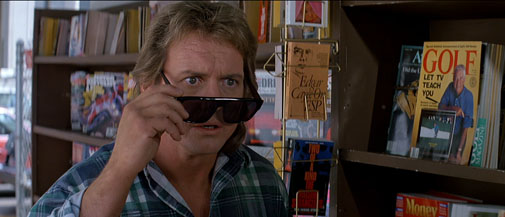|
|
Viking Night: They LiveBy Bruce HallAugust 4, 2015
This is probably why John Carpenter picked him for the lead role in “They Live”, 1998’s tongue-in-cheek satire about the vanishing line between culture and pop consumerism. And in case you’re starting out fuzzy on that, the first ten minutes pretty much hammer it home. A down-on-his-luck construction worker named Nada (Piper), lands in Los Angeles with nothing but the blank expression of a professional wrestler turned actor, and whatever else he can carry on his back. He finds no kindness in the City of Angels, because nobody there appreciates good honest work, or good honest workers. So Nada wanders, and as he does, he rubs elbows with an apocalyptic street preacher who, if you listen, lays down the theme of the story for you. Then, as if to further prove the point, Nada notices something peculiar about the city. All around, there’s a stark dichotomy between classes, with vagrants camped outside the open windows of comfortable middle class apartments. Inside, fat/happy consumers drool away in front of the television, soaking up cathode rays like sunlight. Nada watches this with the semi-amused detachment of a guy who’s already up above it. Carpenter lays it on a little thick here, doing backflips to remind us that we’re a society living under the thumb of greedy, conniving Overlords. Obviously, what humanity needs is a savior; someone to open our eyes. Lucky for us, as the hero of this story, Nada is not down with being a media hero.
|

|
|
|

|
Friday, November 1, 2024
© 2024 Box Office Prophets, a division of One Of Us, Inc.


